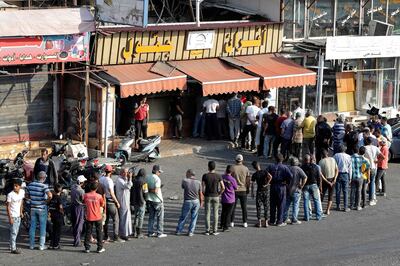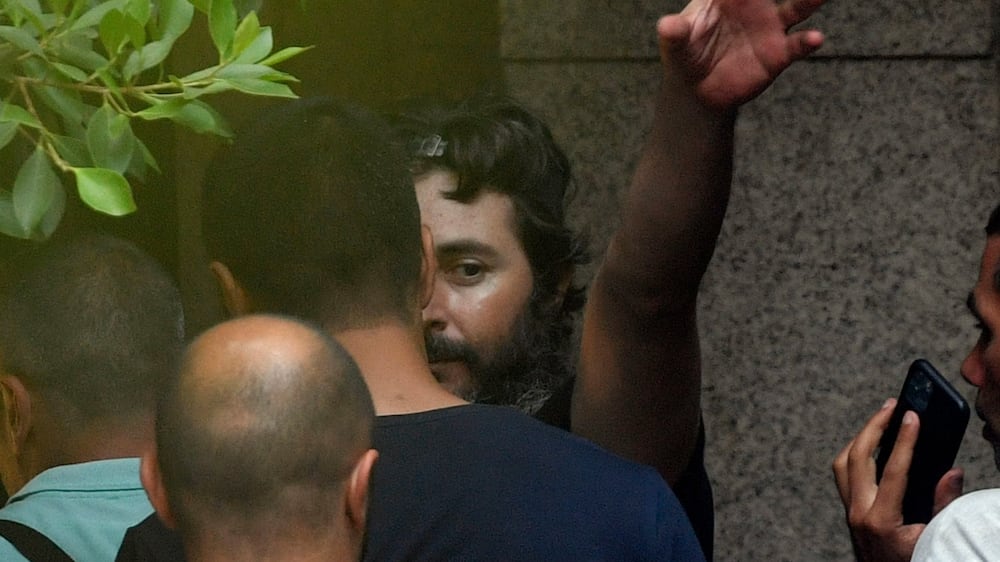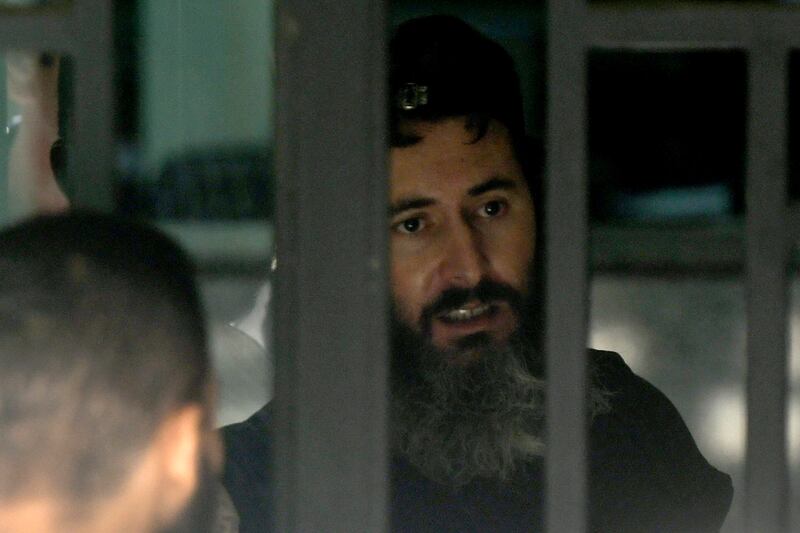After seven hours, Bassam Hussein, who took several hostages and held up a bank in Lebanon, surrendered on Thursday evening — but not before he successfully negotiated the withdrawal of $35,000 from his own account.
A judge on Friday ordered that he remain behind bars, despite promises from security forces that he would not be detained, his lawyer and family members said. It was not clear on what charges he was detained, the lawyer added.
The armed man had taken at least six hostages — customers and employees — in a Federal Bank of Lebanon branch in Beirut, threatening to kill them and self-immolate if he did not receive his money.
In a scene typical of hostage situations, negotiators and security forces could be seen standing outside the bank entrance throughout the lengthy hold-up, while Mr Hussein's family as well as the families of the hostages anxiously looked on.
But on the other side of the police cordon, dozens of demonstrators gathered — not to condemn Mr Hussein, but to support him and to protest against Lebanon’s banking system.
Speakers blared music and supporters chanted, “We are all Bassam!” and “Down with the rule of the banks!”
The show of popular support for Mr Hussein came as Lebanon's population grows increasingly desperate four years into a dire financial crisis that the World Bank says is one of the worst the modern world has ever seen.
Intensifying widespread financial difficulties are the informal capital controls imposed by commercial banks in late 2019, limiting withdrawals of hard currency. Banks have severely limited the amount of dollars depositors are able to withdraw, otherwise only allowing withdrawals to be made in vastly devalued Lebanese pounds.

This effectively means people can only take out their own money at a fraction of its value.
Since the small nation’s economy collapsed in 2019, the local currency has plummeted more than 90 per cent and inflation has soared exponentially, making everyday life essentially unaffordable for many Lebanese.
Public institutions are on the verge of imploding and the state is unable to maintain even basic services such as electricity and water. More than three quarters of Lebanon's population has been plunged below the poverty line, according to the UN.
Family members and supporters blocked a road on Friday morning to protest against Mr Hussein's detention, saying that it breached an agreement reached on Thursday to end the standoff.
Mr Hussein surrendered after being assured by negotiators that he would undergo a routine investigation and then be released, his brother, Atef, told The National.
“We don’t know when he’ll get out. We’re not able to communicate with him, and we don’t know what the charge against him is,” he said.
Beirut bank hostage situation comes to end after apparent partial payout

Atef helped to talk his brother into surrendering and left the scene with him in a white government vehicle on Thursday night.
“They told us ‘he will not be detained and will go home with you’, but that he should first stop by the branch,” Atef said, referring to the Information Branch of the Internal Security Forces. He explained the ISF had assured him it would be a routine investigation.
But as of Friday night, Mr Hussein was still in detention.
“I regret ever telling my brother to get out of the bank without taking the full amount of his savings first,” Atef told The National.
Throughout the stand-off, Mr Hussein had demanded that his savings — $210,000 — be returned to him in full.
“The amount he managed to take out doesn't even cover his debts,” his brother said. “But what was the solution, to keep the hostage crisis going?”
Fouad Debs, co-founder of the Lebanese Depositor’s Union and one of the lawyers representing Mr Hussein, confirmed the hostage-taker had been detained without a clear charge.
The $35,000 he was able to withdraw is reportedly now with his family and in a safe place, Mr Debs said.
But that amount is not nearly enough to cover his disabled father’s hospital stay and treatment, which was the driving factor behind his decision to hold up the bank, Mr Debs and and family members said.
“He had to take a loan for $6,000 for his [dad’s] hospitalisation when our own money is sitting in the bank,” Atef told The National.
Locked out of the majority of their savings, many Lebanese have been forced to incur debt, with withdrawal limits hampering their ability to pay off arrears such as hospital visits or school tuition. Reports of patients being turned away from hospitals — in some cases dying at the entrance — are not infrequent.
In demanding his own money, Mr Hussein has become emblematic of the nation’s disenfranchised population. Lebanon's financial collapse is widely blamed on its political leaders, many of them ex-warlords and holdovers from the country's 15-year civil war.
Before the economic crash, Mr Hussein had sold his own as well as his family’s home and placed the proceeds in his bank account before the informal nationwide capital controls were imposed. In addition, siblings in Australia had transferred considerable sums of money into the account so that Mr Hussein could purchase property on their behalf.
Mr Debs emphasised that the hostage-taker’s demands were not illegal.
“He was demanding his own money after he tried to get it through legal means and was repeatedly denied until he took justice into his own hands,” Mr Debs said.
He added that Mr Hussein did not demonstrate any violence, despite two reports of two shots being fired early on in the stand-off.
The Lebanese Depositor’s Union was formed in 2019 to protect the rights of depositors, advocate a fair and comprehensive financial recovery plan, and seek accountability for the economic crisis.
“It's them who have brought the country to where we are ,” Mr Debs said, referring to Lebanon's leaders.
“This country didn't collapse — they collapsed it. They, the political authorities and the banking authority, should be held responsible for it.
“They're what's leading to people to doing what Bassam did. In the end, he did what he had to do and it’s a clear reaction to their actions.”
One of the hostages taken by Mr Hussein was the branch manager of the Federal Bank, Hassan Halawi.
Mr Halawi said he did not enjoy being a hostage, but would not press charges against the hostage taker.
"What can I say? It's his right. But this isn't the way. A small mistake could have ended our lives."
Mr Hussein had frequently butted heads with Mr Halawi in recent weeks while being denied the withdrawal of small quantities of money, his lawyer told The National.
But Mr Halawi maintained that the bank treated Mr Hussein the same as all customers, and "in accordance with our internal procedures."
Earlier this year, another hold-up took place at a bank in eastern Lebanon’s Bekaa valley. Coffee shop owner Abdullah Assai threatened to immolate himself and his hostages unless he could withdraw his savings. He surrendered after withdrawing $50,000 of his own money, which he handed to his wife before being arrested.
Mr Assai was detained for a total of 16 days before being released after paying a fine.
Mr Debs told The National he was surprised that there have not been more bank hold-ups in the last three years.
Such incidents should help put pressure on Lebanon's political leadership and its banks — who have consistently butted heads over who should absorb the brunt of losses — to enact a financial recovery plan, he said.
"We cannot keep going like this."
But Atef said his biggest priority now was getting his brother out of detention.
“The real thieves are out there, free, while he’s in jail. They stole from us, and my brother is in jail.”







